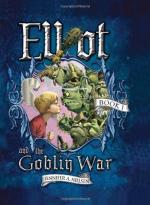“Just sit there a wee, my dochter,” she said with rough kindness, “an’ you’ll soon be a’ richt. They mostly a’ feel that way when they first start on the scree.”
Mysie was feeling sick, and already the thought was shaping in her mind that she would never be able to continue. She had only worked an hour as yet, but it seemed to her a whole day.
“Six and sixpence a week” sang the tables as they swung; “six and sixpence a week” whirred the engines; “six and sixpence a week” crashed the screes; and her head began to throb with the roar of it all. “Six and sixpence a week” as the coal tumbled down the chutes into the wagons; “six and sixpence” crunched the wheels, until it seemed as if everything about a pit were done to the tune of “six and sixpence a week.”
It was thundered about her from one corner, it squealed at her from another, roared at her from behind, groaned at her in front; it wheezed from the roof, and the very shed in which they stood swayed and shivered to its monotonous song. “Six and sixpence a week” was working into every fiber of her being. She had been born to it, was living it, and it seemed that the very wheels of eternity were grinding out her destiny to its roar and its crash, and its terrible regular throb and swing.
She grew still more sick, and vomited; so one of the women took her by the hand and led her down the narrow rickety wooden stair out across the dirt “bing” into the pure air. In a quarter of an hour she brought her back almost well, except for the pain in her head.
“Where the hell hae ye been, Mag?” wheezed the old gaffer, addressing the woman with irritated authority.
“Awa’ an’ boil yer can, auld belly-crawler,” was the elegant response, as she bent to her work, taking as little notice of him as if he were a piece of coal.
“Ye’re awa’ faur owre much,” he returned. This was an allusion to clandestine meetings which were sometimes arranged between some of the men in authority—“penny gaffers,” as they were called—and some of the girls who took their fancy.
After all, gaffers had certain powers of advancement, and could increase wages to those who found favor in their eyes, to the extent of a penny or twopence per day, and justified it by representing that these girls were value for it, because they were better workers. Again, matters were always easier to these girls of easy virtue, for they got better jobs, and could even flout the authority of lesser gaffers, if their relations with the higher ones were as indicated.
Mag replied with a coarse jest, and the others laughed roughly, and Mysie and Robert, not understanding, wondered why the old man got angry.
Thus the day wore on, men and women cursed while familiarities took place which were barely hidden from the children. Talk was coarse and obscenely suggestive, and the whole atmosphere was brutalizing. Long, however, before the day was ended, Robert and Mysie were feeling as if every bone in their little bodies would break.




